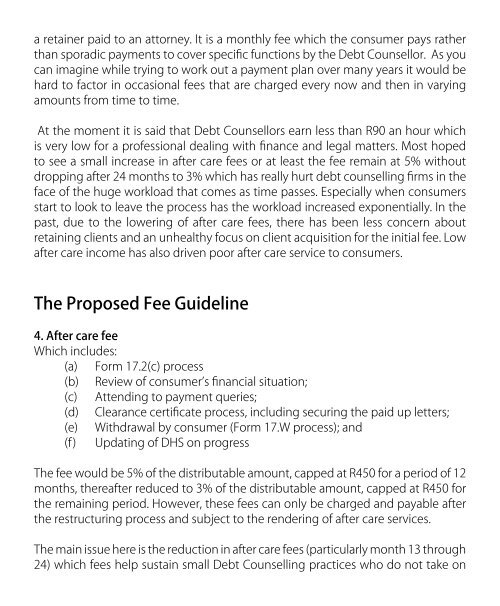Debtfree Magazine Sept 2017
SA's Free Debt Counselling and Debt Review industry magazine- The September 2017 issue. We discuss the new possible fees for debt review as suggested by the NCR. We also look at recent industry events, consumer tips and advice for those under debt review.
SA's Free Debt Counselling and Debt Review industry magazine- The September 2017 issue. We discuss the new possible fees for debt review as suggested by the NCR. We also look at recent industry events, consumer tips and advice for those under debt review.
Create successful ePaper yourself
Turn your PDF publications into a flip-book with our unique Google optimized e-Paper software.
a retainer paid to an attorney. It is a monthly fee which the consumer pays rather<br />
than sporadic payments to cover specific functions by the Debt Counsellor. As you<br />
can imagine while trying to work out a payment plan over many years it would be<br />
hard to factor in occasional fees that are charged every now and then in varying<br />
amounts from time to time.<br />
At the moment it is said that Debt Counsellors earn less than R90 an hour which<br />
is very low for a professional dealing with finance and legal matters. Most hoped<br />
to see a small increase in after care fees or at least the fee remain at 5% without<br />
dropping after 24 months to 3% which has really hurt debt counselling firms in the<br />
face of the huge workload that comes as time passes. Especially when consumers<br />
start to look to leave the process has the workload increased exponentially. In the<br />
past, due to the lowering of after care fees, there has been less concern about<br />
retaining clients and an unhealthy focus on client acquisition for the initial fee. Low<br />
after care income has also driven poor after care service to consumers.<br />
The Proposed Fee Guideline<br />
4. After care fee<br />
Which includes:<br />
(a) Form 17.2(c) process<br />
(b) Review of consumer’s financial situation;<br />
(c) Attending to payment queries;<br />
(d) Clearance certificate process, including securing the paid up letters;<br />
(e) Withdrawal by consumer (Form 17.W process); and<br />
(f) Updating of DHS on progress<br />
The fee would be 5% of the distributable amount, capped at R450 for a period of 12<br />
months, thereafter reduced to 3% of the distributable amount, capped at R450 for<br />
the remaining period. However, these fees can only be charged and payable after<br />
the restructuring process and subject to the rendering of after care services.<br />
The main issue here is the reduction in after care fees (particularly month 13 through<br />
24) which fees help sustain small Debt Counselling practices who do not take on


















